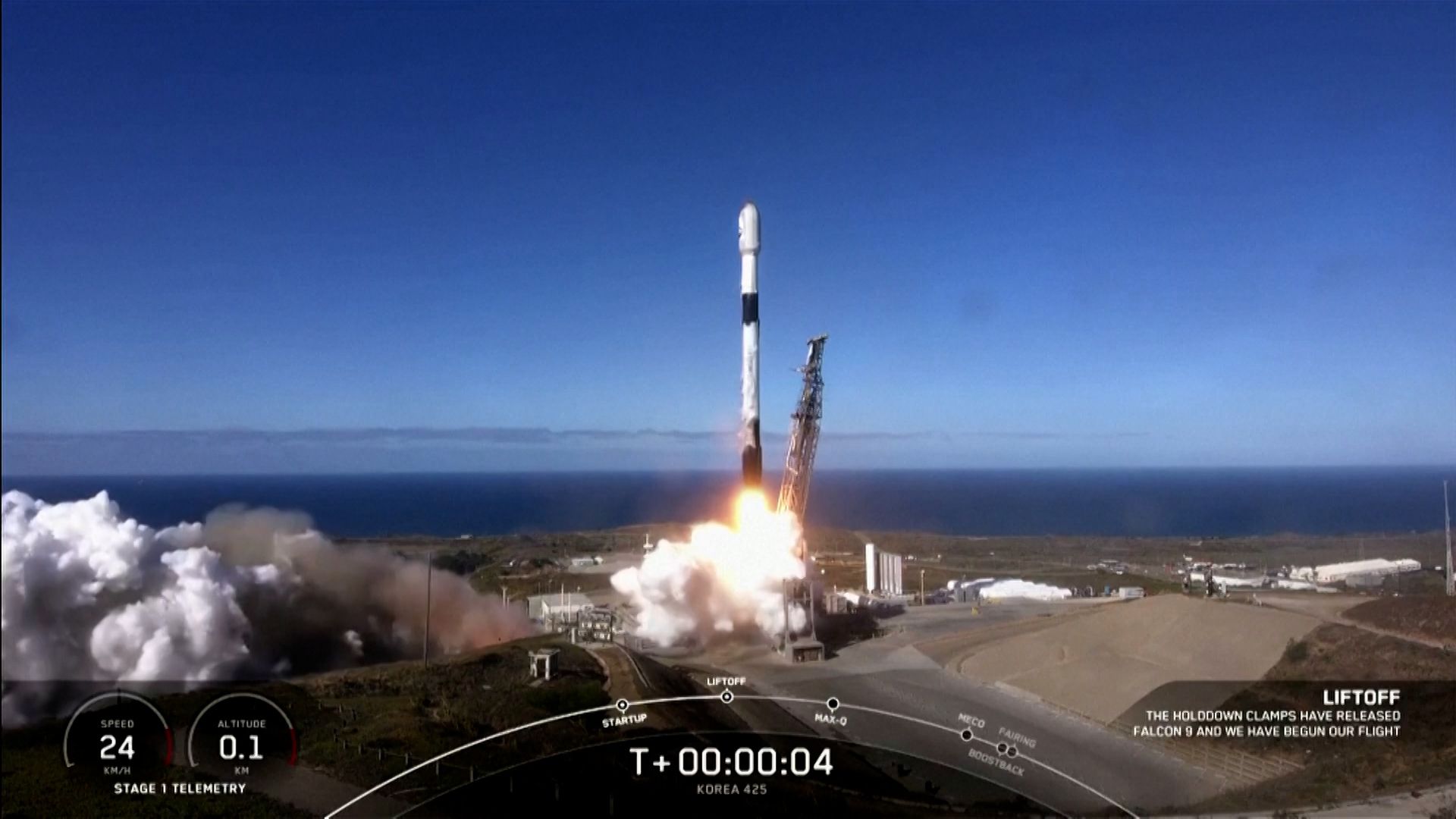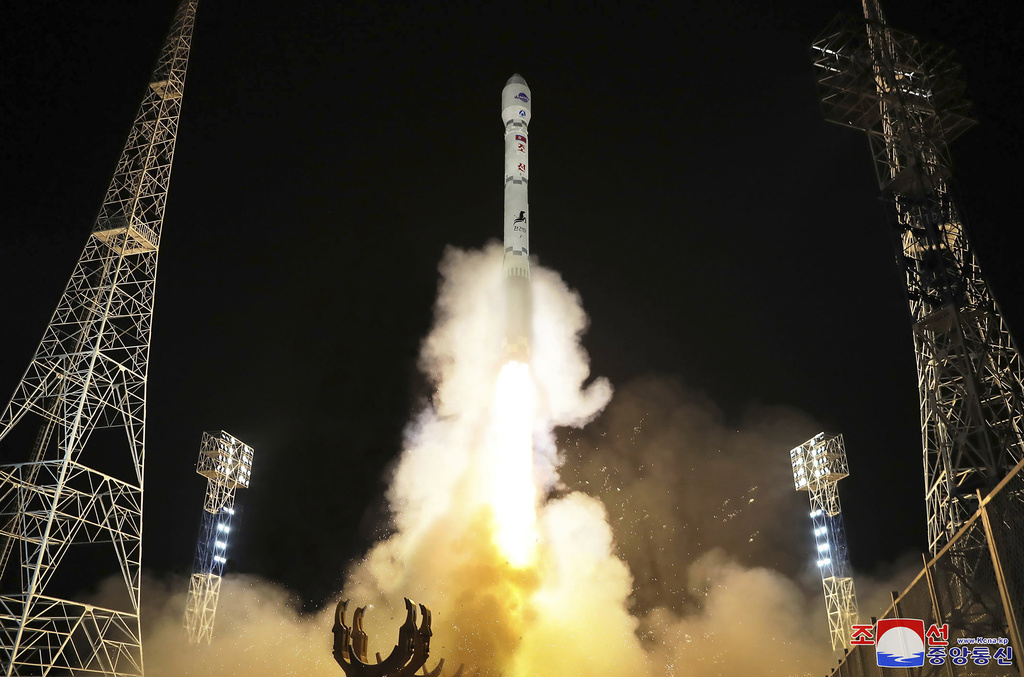
SpaceX launches S. Korean spy satellite days after North’s launch
Dec 01, 2023
By William Jackson (Producer)
Media Landscape
See who else is reporting on this story and which side of the political spectrum they lean. To read other sources, click on the plus signs below.
Learn more about this dataLeft 28%
Center 43%
Right 30%
Bias Distribution
Far
Left
+0
Click to close
Left
+0
Click to close
South Korea launches its first spy satellite after rival North Korea does the same
Click to see story on Associated Press News
South Korea launches its first spy satellite after rival North Korea does the same
Click to see story on abc News
New sanctions imposed on North Korea
Click to see story on Sueddeutsche Zeitung
South Korea launches its first spy satellite after rival North Korea does the same
Click to see story on Coast Reporter
S. Korea’s first spy satellite set to lift off from Vandenberg Space Force Base
Click to see story on The Korea Times
South Korea launches its first spy satellite after rival North Korea does the same
Click to see story on Sask Today
South Korea launches its first spy satellite after rival North Korea does the same
Click to see story on Rocky Mountain Outlook
South Korea deploys first military spy satellite with SpaceX rocket
Click to see story on Le Monde
South Korea launches its first spy satellite after rival North Korea does the same
Click to see story on Prince George Citizen
US, allies impose sanctions on N Korea following satellite launch
Click to see story on Radio Free Asia
US, allies sanction Russia-based North Koreans over satellite launch
Click to see story on The Kyiv Independent
Click to close
SpaceX launches South Korean first spy satellite from California
Click to see story on Hindustan Times
South Korea launches its first spy satellite after rival North Korea does the same
Click to see story on KIFI
South Korea set to launch first spy satellite with SpaceX
Click to see story on Channel News Asia
Ireland set to launch first satellite into space
Click to see story on RTÉ
S. Korea set to launch first spy satellite with SpaceX
Click to see story on The Guardian Nigeria
SpaceX launches South Korean spy satellite from California
Click to see story on The Print
South Korea launches spy satellite after North Korea does the same
Click to see story on Spectrum News
South Korea launches its first spy satellite after rival North Korea does the same
Click to see story on San Diego Union Tribune
SpaceX launches South Korean spy satellite from California
Click to see story on Devdiscourse
US, partners target North Korea with sanctions following satellite launch
Click to see story on WTVB
U.S. slaps sanctions on North Korea in response to spy satellite launch
Click to see story on Kyodo News+
Watch SpaceX launch Irish, South Korean satellites on Falcon 9 rocket today
Click to see story on Space
US govt sanctions North Korea’s Kimsuky hacking group
Click to see story on BleepingComputer
US, South Korea and Japan sanction North Koreans over spy satellite launch
Click to see story on NK News
South Korea launches first spy satellite after North Korea does same
Click to see story on C4ISRNET
South Korean aerospace company to launch satellite with SpaceX in 2025 – La Prensa Latina Media
Click to see story on La Prensa Latina Media
Live coverage: SpaceX to launch ride share mission with South Korean reconnaissance satellite, first Irish satellite
Click to see story on spaceflightnow.com
Click to close
South Korea launches its first spy satellite after rival North Korea does the same
Click to see story on Times of India
South Korea launches its first spy satellite after rival North Korea does the same
Click to see story on Financial Post
US, partners target North Korea with sanctions following satellite launch
Click to see story on The Straits Times
S. Korea set to launch first spy satellite with SpaceX tomorrow
Click to see story on Malay Mail
Australia sanctions North Korea over satellite launch
Click to see story on The West Australian
US, Japan, Australia, South Korea impose fresh sanctions on North Korea
Click to see story on Anadolu Ajansı
The US launched a Falcon 9 rocket with South Korea’s first spy satellite
Click to see story on RIA Novosti [🇷🇺-affiliated]
After North Korea, South Korea is also launching its first spy satellite
Click to see story on Het Laatste Nieuws
US, Partners Target North Korea with Sanctions Following Satellite Launch
Click to see story on 読売新聞オンライン
Click to close
Far
Right
+0
Click to close
Untracked Bias
US imposes new sanctions against North Korea after launch of spy satellite
Click to see story on ZN.UA Зеркало недели
Japan extends sanctions against North Korea after launch of spy satellite
Click to see story on Observador
Coreia do Sul lançou o seu primeiro satélite espião
Click to see story on Noticias ao Minuto
South Korea also launches its first spy satellite
Click to see story on Het Nieuwsblad
South Korea also launches its first spy satellite
Click to see story on Het Belang van Limburg
Australia sanctions North Korea over satellite launch
Click to see story on PerthNow
Posle Pjongjanga i Južna Koreja lansirala svoj prvi špijunski satelit
Click to see story on Dnevni list Danas
The Falcon 9 launched a South Korean spy satellite into space. Will be watching the DPRK
Click to see story on iDNES.cz
US, South Korea jointly sanction North Korean hackers and citizens
Click to see story on TUOI TRE ONLINE
Nach nordkoreanischem Start – Seoul bringt ersten Spionagesatelliten ins All
Click to see story on Deutschlandfunk
US, partners target North Korea with sanctions following satellite launch
Click to see story on DD News
Satellite – South Korea imposes sanctions on North Korea
Click to see story on Salzburger Nachrichten
Sydkorea svarar Nordkorea med ny spionsatellit
Click to see story on unt.se
South Korea launches its first spy satellite after rival North Korea does the same – The Morning Sun
Click to see story on communityq.com
Posle Pjongjanga: I Južna Koreja lansirala svoj prvi špijunski satelit
Click to see story on n1info.rs
South Korea, Japan, US and Australia impose sanctions after North Korea satellite launch
Click to see story on baotintuc.vn
كوريا الجنوبية تطلق أول قمر اصطناعي للتجسس العسكري
Click to see story on aletihad.ae
Click to close
57 other sources covering this story
Total News Sources
57
Leaning Left
11
Center
17
Leaning Right
12
Last Updated
5 months ago
A SpaceX Falcon 9 rocket launched South Korea’s first homegrown spy satellite from California’s Vandenberg Space Force Base on Friday, Dec. 1. The launch follows North Korea’s recent successful launch of its own spy satellite.
Falcon 9’s first stage has landed on Landing Zone 4, completing our 250th landing of a Falcon first stage booster pic.twitter.com/ZkOjq4hNRy
— SpaceX (@SpaceX) December 1, 2023
The satellite is equipped with electro-optical and infrared capabilities, following launches will feature synthetic aperture radar (SAR), which can “see” through cloud cover and at night.
South Korea has contracted SpaceX to launch a total of five spy satellites by 2025, aiming to achieve continuous surveillance of the Korean Peninsula.
There are a total of 25 spacecraft on board this mission, including KOREA’s 425, Space BD’s ISL48, SITAEL’s microHETSat, D-Orbit’s ION SCV Daring Diego, York Space Systems’ Bane, and PlanetIQ’s GNOMES-4.
The launch was postponed after North Korea declared the success of its military spy satellite launch in November. North Korea used its Chollima-1 launch vehicle to reportedly launch the Malligyong-1 reconnaissance satellite, succeeding after two prior failed attempts this year.

While Pyongyang hasn’t released satellite imagery, it asserts capturing various target regions, including the White House, Pentagon, U.S. military bases in South Korea, Guam, Hawaii and Seoul. Analysts note that the satellite’s complete capabilities remain unknown.
Unbiased news.
Directly to your inbox. Free!
Learn more about our emails. Unsubscribe anytime.
By entering your email, you agree to the Terms & Conditions and acknowledge the Privacy Policy.
The U.N. Security Council prohibits North Korea from launching satellites, considering them a veiled test of its missile technology.
South Korea warned North Korea last month against proceeding with its spy satellite launch, indicating that Seoul might suspend a tension-reduction agreement and resume front-line aerial surveillance in response.
Media Landscape
See who else is reporting on this story and which side of the political spectrum they lean. To read other sources, click on the plus signs below.
Learn more about this dataLeft 28%
Center 43%
Right 30%
Bias Distribution
Far
Left
+0
Click to close
Left
+0
Click to close
South Korea launches its first spy satellite after rival North Korea does the same
Click to see story on Associated Press News
South Korea launches its first spy satellite after rival North Korea does the same
Click to see story on abc News
New sanctions imposed on North Korea
Click to see story on Sueddeutsche Zeitung
South Korea launches its first spy satellite after rival North Korea does the same
Click to see story on Coast Reporter
S. Korea’s first spy satellite set to lift off from Vandenberg Space Force Base
Click to see story on The Korea Times
South Korea launches its first spy satellite after rival North Korea does the same
Click to see story on Sask Today
South Korea launches its first spy satellite after rival North Korea does the same
Click to see story on Rocky Mountain Outlook
South Korea deploys first military spy satellite with SpaceX rocket
Click to see story on Le Monde
South Korea launches its first spy satellite after rival North Korea does the same
Click to see story on Prince George Citizen
US, allies impose sanctions on N Korea following satellite launch
Click to see story on Radio Free Asia
US, allies sanction Russia-based North Koreans over satellite launch
Click to see story on The Kyiv Independent
Click to close
SpaceX launches South Korean first spy satellite from California
Click to see story on Hindustan Times
South Korea launches its first spy satellite after rival North Korea does the same
Click to see story on KIFI
South Korea set to launch first spy satellite with SpaceX
Click to see story on Channel News Asia
Ireland set to launch first satellite into space
Click to see story on RTÉ
S. Korea set to launch first spy satellite with SpaceX
Click to see story on The Guardian Nigeria
SpaceX launches South Korean spy satellite from California
Click to see story on The Print
South Korea launches spy satellite after North Korea does the same
Click to see story on Spectrum News
South Korea launches its first spy satellite after rival North Korea does the same
Click to see story on San Diego Union Tribune
SpaceX launches South Korean spy satellite from California
Click to see story on Devdiscourse
US, partners target North Korea with sanctions following satellite launch
Click to see story on WTVB
U.S. slaps sanctions on North Korea in response to spy satellite launch
Click to see story on Kyodo News+
Watch SpaceX launch Irish, South Korean satellites on Falcon 9 rocket today
Click to see story on Space
US govt sanctions North Korea’s Kimsuky hacking group
Click to see story on BleepingComputer
US, South Korea and Japan sanction North Koreans over spy satellite launch
Click to see story on NK News
South Korea launches first spy satellite after North Korea does same
Click to see story on C4ISRNET
South Korean aerospace company to launch satellite with SpaceX in 2025 – La Prensa Latina Media
Click to see story on La Prensa Latina Media
Live coverage: SpaceX to launch ride share mission with South Korean reconnaissance satellite, first Irish satellite
Click to see story on spaceflightnow.com
Click to close
South Korea launches its first spy satellite after rival North Korea does the same
Click to see story on Times of India
South Korea launches its first spy satellite after rival North Korea does the same
Click to see story on Financial Post
US, partners target North Korea with sanctions following satellite launch
Click to see story on The Straits Times
S. Korea set to launch first spy satellite with SpaceX tomorrow
Click to see story on Malay Mail
Australia sanctions North Korea over satellite launch
Click to see story on The West Australian
US, Japan, Australia, South Korea impose fresh sanctions on North Korea
Click to see story on Anadolu Ajansı
The US launched a Falcon 9 rocket with South Korea’s first spy satellite
Click to see story on RIA Novosti [🇷🇺-affiliated]
After North Korea, South Korea is also launching its first spy satellite
Click to see story on Het Laatste Nieuws
US, Partners Target North Korea with Sanctions Following Satellite Launch
Click to see story on 読売新聞オンライン
Click to close
Far
Right
+0
Click to close
Untracked Bias
US imposes new sanctions against North Korea after launch of spy satellite
Click to see story on ZN.UA Зеркало недели
Japan extends sanctions against North Korea after launch of spy satellite
Click to see story on Observador
Coreia do Sul lançou o seu primeiro satélite espião
Click to see story on Noticias ao Minuto
South Korea also launches its first spy satellite
Click to see story on Het Nieuwsblad
South Korea also launches its first spy satellite
Click to see story on Het Belang van Limburg
Australia sanctions North Korea over satellite launch
Click to see story on PerthNow
Posle Pjongjanga i Južna Koreja lansirala svoj prvi špijunski satelit
Click to see story on Dnevni list Danas
The Falcon 9 launched a South Korean spy satellite into space. Will be watching the DPRK
Click to see story on iDNES.cz
US, South Korea jointly sanction North Korean hackers and citizens
Click to see story on TUOI TRE ONLINE
Nach nordkoreanischem Start – Seoul bringt ersten Spionagesatelliten ins All
Click to see story on Deutschlandfunk
US, partners target North Korea with sanctions following satellite launch
Click to see story on DD News
Satellite – South Korea imposes sanctions on North Korea
Click to see story on Salzburger Nachrichten
Sydkorea svarar Nordkorea med ny spionsatellit
Click to see story on unt.se
South Korea launches its first spy satellite after rival North Korea does the same – The Morning Sun
Click to see story on communityq.com
Posle Pjongjanga: I Južna Koreja lansirala svoj prvi špijunski satelit
Click to see story on n1info.rs
South Korea, Japan, US and Australia impose sanctions after North Korea satellite launch
Click to see story on baotintuc.vn
كوريا الجنوبية تطلق أول قمر اصطناعي للتجسس العسكري
Click to see story on aletihad.ae
Click to close
57 other sources covering this story
Total News Sources
57
Leaning Left
11
Center
17
Leaning Right
12
Last Updated
5 months ago
Unbiased news.
Directly to
your inbox.
Free!
MOST POPULAR
-
 Getty Images
Getty Images
Harvey Weinstein’s rape conviction overturned, victims could see new trial
Watch 2:13
Thursday
-
 Getty Images
Getty Images
Pythons decimate Florida’s wildlife, is eating them the answer?
Watch 2:04
Tuesday
-
 Getty Images
Getty Images
Trump could lose Secret Service protection if found guilty
Watch 2:10
Tuesday
-
 AP Images
AP Images
Argentina asks to join NATO as Milei looks to enhance security, strengthen ties
Watch 1:57
Apr 19
